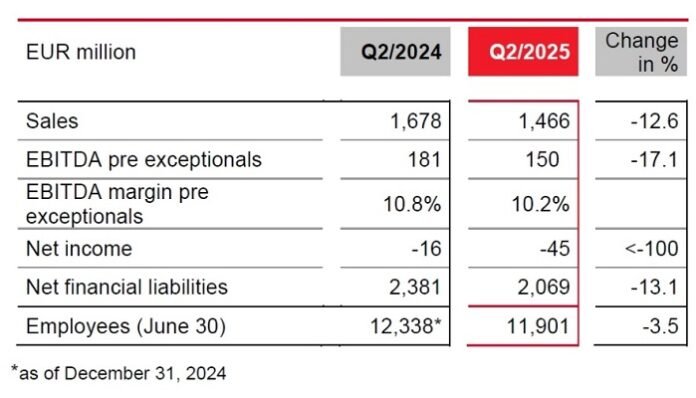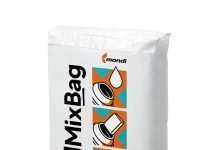
A weak global market environment impacted Lanxess’ results in the second quarter of 2025. The specialty chemicals company achieved an EBITDA pre exceptionals of 150 million Euros, which is a 17.1% decline compared with the figure of 181 million Euros from the same quarter last year. Weaker demand in general was accompanied by lower sales volumes in all segments. The sale of the Urethane Systems business unit effective April 1, 2025, also contributed significantly to the decline in earnings. Second-quarter sales amounted to 1.466 billion Euros, down 12.6% on the prior-year figure of 1.678 billion Euros.
“The economic environment has deteriorated significantly again in recent months. Additionally, ongoing tariff discussions with the US are causing considerable market uncertainty and exacerbating the situation for the European chemical industry. There is currently no improvement in sight for the economic situation,” says Matthias Zachert, CEO of Lanxess. “For us, this means continuing to focus fully on achieving the best possible positioning in the market, as well as in terms of costs, structures, and processes. When the economy picks up again, we will be ready and able to meet the additional demand much more efficiently and profitably.”
The EBITDA margin pre exceptionals was 10.2% in the second quarter, compared with 10.8 percent in the same period last year.
Due to the expected continued weak demand for the remainder of the year, Lanxess is adjusting its guidance for fiscal year 2025 and now anticipates an EBITDA pre exceptionals of between 520 million Euros and 580 million Euros. This includes a burden of 10 million Euros related to supply restrictions from a chlorine supplier. The Group had previously anticipated earnings of between 600 million Euros and 650 million Euros.
Further significant debt reduction through sale of Urethane Systems
On 1 April, 2025, Lanxess sold its Urethane Systems business to Japan’s UBE Corporation, thereby divesting its last remaining polymer business. This transaction marked the final major step in the restructuring of the portfolio toward specialty chemicals.
The business unit’s contribution to earnings is no longer included in the quarterly figures. Lanxess used the proceeds from the sale to redeem the 500 million Euros benchmark bond that matured in May 2025. The proceeds from the sale reduced the company’s net financial debt by 18% from 2.512 billion Euros in the first quarter of 2025 to 2.069 billion Euros in the second quarter of 2025.
Despite the difficult market conditions, the company generated positive free cash flow of 31 million Euros in the second quarter.
Further optimization of the global production network
To actively counteract the global weakness in demand, Lanxess is further optimizing its global production network. The Group has already brought forward the closure of its hexane oxidation facility at the Krefeld-Uerdingen site to the end of the second quarter of 2025. Lanxess also plans to streamline its global network of aroma chemicals plants and shut down production at its Widnes site (UK) in the course of 2026. Due to high costs, the company can no longer operate the Widnes site competitively. At the El Dorado site (USA), Lanxess plans to increase efficiency of bromine production. These measures are expected to result in permanent annual savings of 50 million Euros from the end of 2027.
Business development in the segments
The Consumer Protection segment achieved sales of 489 million Euros in the second quarter of 2025, making a 12.8% decrease from the previous year’s figure of 561 million Euros. Despite the sales decline, EBITDA pre exceptionals increased from 80 million Euros in the same period last year to 87 million Euros, an 8.8% rise. An improved product mix, an insurance compensation, and cost savings from the ‘forward’ action plan had a positive impact on earnings and profitability. The EBITDA margin pre exceptionals increased from 14.3% in the same period last year to 17.8%.
The Specialty Additives segment reported sales of 528 million Euros, down 7.0% from 568 million Euros in the second quarter of 2024. EBITDA pre exceptionals decreased by 17.1% from 70 million Euros in the prior-year quarter to 58 million Euros. The decline in earnings was primarily due to weak demand from the construction industry; higher energy costs also negatively impacted results. The EBITDA margin pre exceptionals was 11.0%, compared with 12.3 percent in the prior-year quarter.
In the Advanced Intermediates segment, sales declined to 446 million Euros in the second quarter of 2025, representing a decrease of 6.7% compared with the prior-year figure of 478 million Euros. EBITDA pre exceptionals reached 44 million Euros, down 24.1% from 58 million Euros in the same period last year. Weak demand and lower capacity utilization negatively impacted earnings and margins. The EBITDA margin pre exceptionals was 9.9 percent, below the previous year’s figure of 12.1%.








